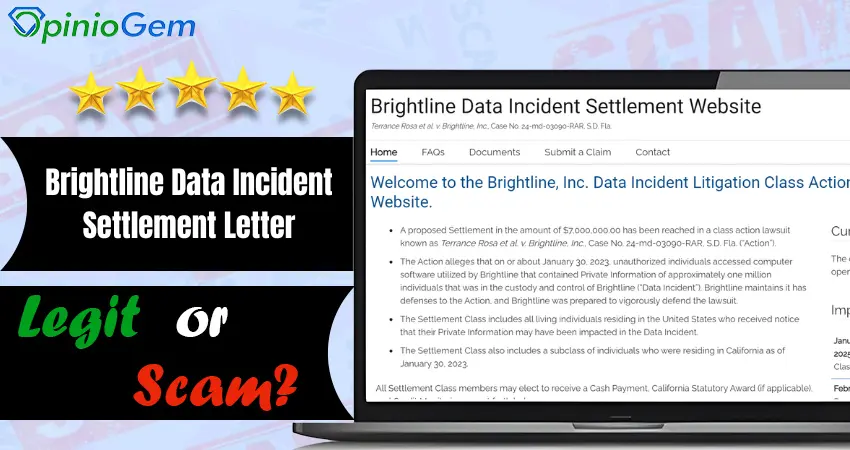A letter you might have received about the Brightline Data Incident Settlement. If you got this letter, you may be wondering if it’s real, if the $100 offer is worth taking, or if it’s just another scam. I’ll break down the details in a simple way to help you decide.
What is the Brightline Data Incident Settlement?
In January 2023, Brightline, a company that handles health data, had a major data breach.
This means hackers got access to the personal info of nearly a million people—names, contact details, and possibly more sensitive stuff.
Because of this, Brightline faced a lawsuit, which ended in a $7 million settlement.
If you received a notice about this settlement, it likely means your data was involved in the breach.
The settlement is real. It’s part of a class-action case called “Terren Rosa et al. v. Brightline Inc.” in the Southern District of Florida.
The letter you received should mention this case and the $7 million settlement.
If you want to be extra sure, you can look up the details on the official settlement website or check court records.
Knowing it’s legitimate is important since scams sometimes copy real settlements to trick people.

Our Opinion
If you’re part of the group affected, you have a few options for getting compensated. Here’s a quick look:
- Cash Payment A: If you can show proof that the breach caused you money loss, you can claim up to $5,000.
- Cash Payment B: If you don’t have proof of losses, you can still get $100. If you live in California, you qualify for an extra $100 because of state privacy laws.
You can also choose three years of free credit monitoring if you’re worried about identity theft.
This may give you peace of mind if you’re worried about your information being used.
Whether you pick the $100 or the credit monitoring depends on what works best for you.
What to Do If You Get Scammed
Data breaches can lead to scams, so stay alert. If you think someone is using your info in a scam, here’s what you can do:
- Report Suspicious Activity: Tell your bank or credit card company about any strange charges. They can help protect your account.
- Freeze Your Credit: You can place a freeze on your credit with major credit bureaus, stopping new accounts from being opened in your name.
- Check Your Credit Reports: You’re allowed to get a free credit report at least once a year. Regularly checking it can help you spot anything unusual.
- Contact Authorities: If you think your identity has been stolen, report it to the Federal Trade Commission (FTC) and your local police.
Amura Health is an online brand that sells supplements, like weight-loss capsules, and promotes health and wellness.



[…] A letter you might have received about the Brightline Data Incident Settlement. […]
[…] A letter you might have received about the Brightline Data Incident Settlement. […]
[…] A letter you might have received about the Brightline Data Incident Settlement. […]
[…] A letter you might have received about the Brightline Data Incident Settlement. […]
[…] A letter you might have received about the Brightline Data Incident Settlement. […]
[…] A letter you might have received about the Brightline Data Incident Settlement. […]